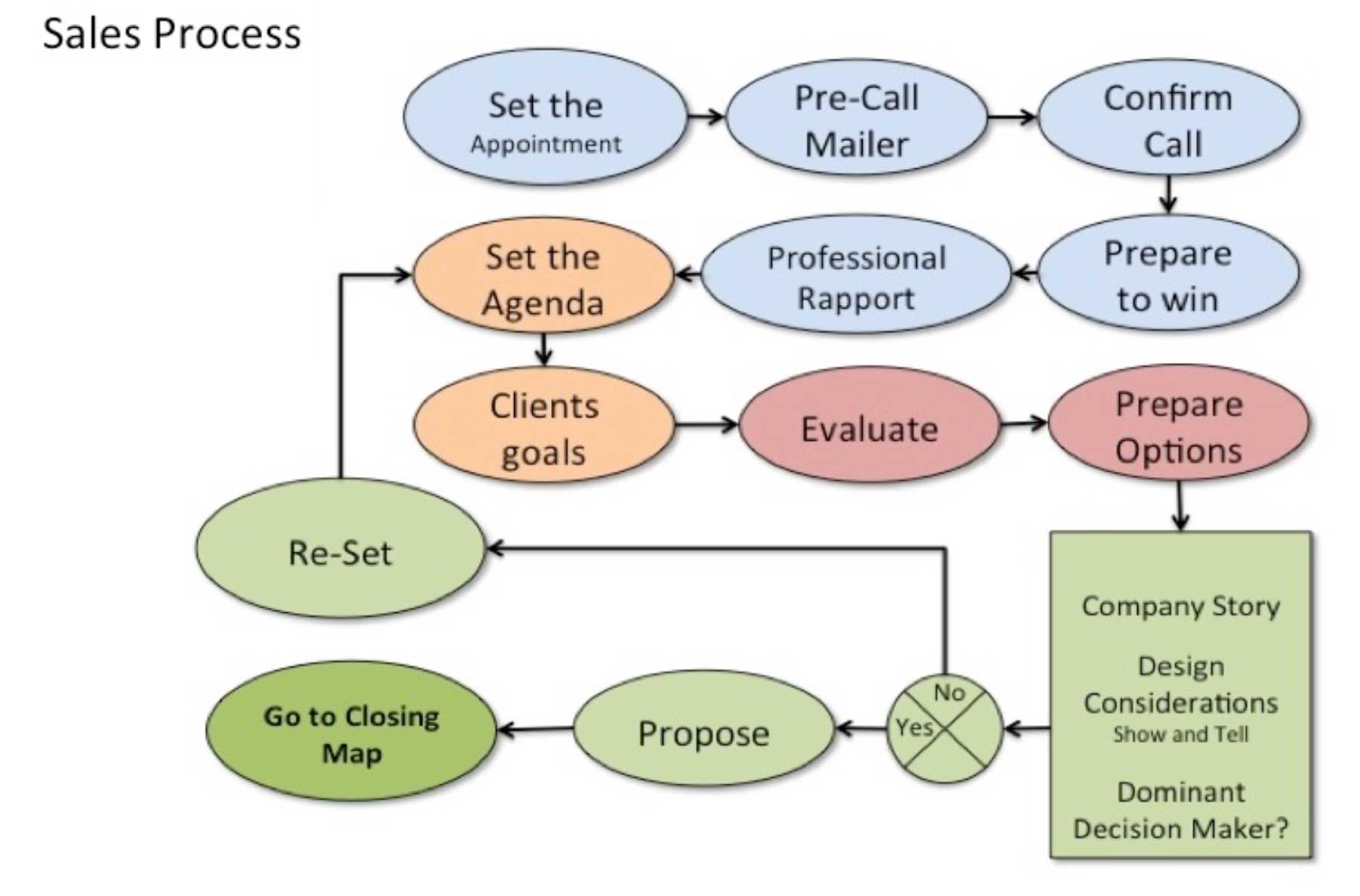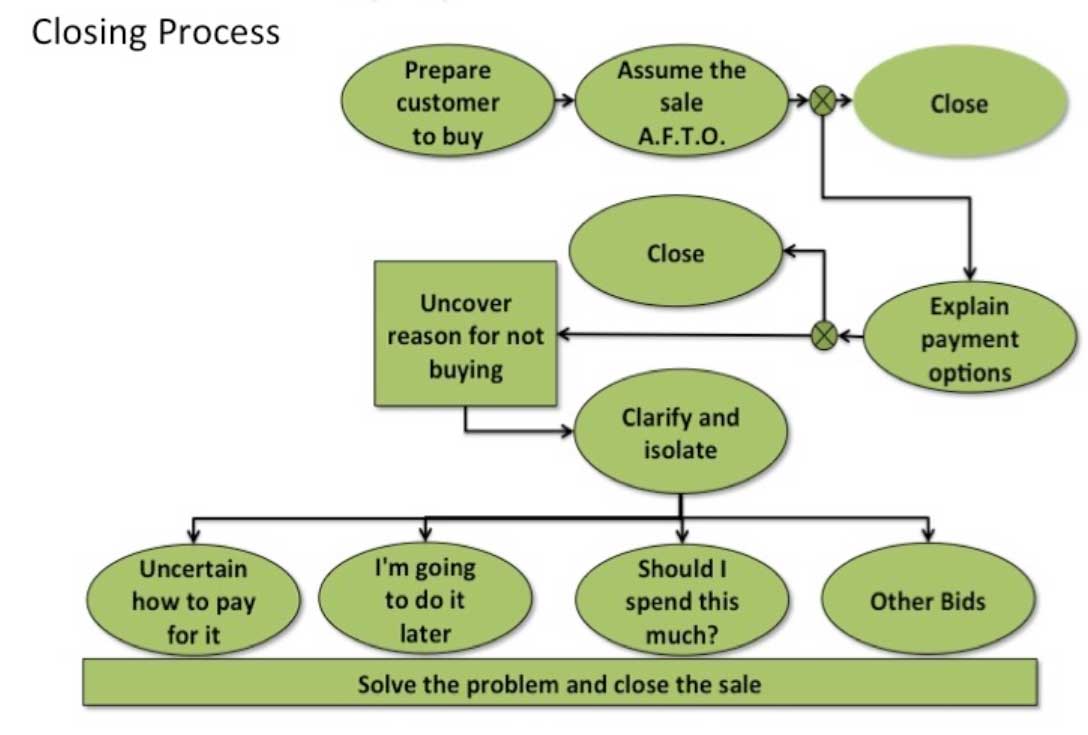Chapter 1
Introduction to the Art of Closing the Sale
For Retail HVAC In Home Comfort Advisors


By: Tom Wittman
HVAC Business Coach-Consultant-Speaker
(317) 750-1607
[email protected]
HVAC Coaching Corner
www.HVACCoachingCorner.com
Pro Comfort Advisor LLC
www.ProComHVAC.com
Closing is the natural result of a well-executed sales process. (Hopkins)
If you are having trouble closing, it’s because you’re doing other things wrong between the time you arrive at your customer’s house and the time you ask for the order. Closing is about everything and everything is about closing.
Everything counts!!
People know salespeople are there to sell. They’ve experienced or heard stories about salespeople lying, cheating and exaggerating or companies not following through and they’re looking for cracks in your story. They’re looking for things that don’t line up; Stories that don’t match. They’re trying to defend themselves by looking for any red flags and any reason they should do the safe thing and not buy from you. Don’t give it to them. Everything counts.
Before you worry about learning the language to close sales or the prepared statements and planned responses, you have to get these things right;
- Trust
- People skills
- Asking questions
- Listening
- Technical knowledge
- Professional and organized sales materials
Until you get these things right, there’s no point in learning anything else about selling. A great close isn’t going to save you if your people skills are no good and you don’t have the ability to influence trust and confidence from your customer. A great close or phrase isn’t going to save you if the customer feels that you know a little bit about the subject but not a lot.
Everything is about closing, and closing is about everything.
Closing is the next step after all the other parts of the sales process is finished. But if you don’t do those parts right, you can’t move forward and ask for the business success because you haven’t earned it. There is no closing statement, process, or strategy that will fix anything that went wrong from the time you arrived at the customer’s house to the time you asked for the order.
Trust
You must influence trust and confidence for your customers. People buy from people they trust and like. They will not buy from people they don’t trust or like. When it comes to influencing trust everything counts. The way you dress, your speech, how you handle tough questions, the questions you ask, how you listen, the quality of your materials, your knowledge and tone of voice. Everything counts.
People skills
People skills can mean a lot of different things but most of all it refers to a person’s ability to reflect behaviors and mannerisms of the person they are speaking to.
People are different. Some are direct and some are indirect. Some like to be in control while others let other people take control. Some are open and some are self-contained. Some need lots of information while others are more concerned that everybody feels good about what’s going on.
Since there are four personality styles and your dominant style can only be one of the four, you will naturally hit it off with about one in for customers. That’s good news. The bad news is that you’re going to have a problem making a connection with the other three out of four and in sales you have to do better than that.
It’s important for you to develop the ability to reflect your customer’s dominant personality style. In other words, you modify your body language, tone of voice, and your presentation to connect with and communicate best with each homeowner.
The first step is to be self-aware. What’s your style; open or more self-contained – Direct or indirect?
The next step is to be aware and notice your customer’s personality style. If the customer has a lot of energy and is very animated with their body language, then you do the same. If their body language is reserved they are very still while speaking, then reflect their behavior.
Matching their voice is also important and easy to do. If they speak loudly, you do too. If they speak fast, then you do too. If they use a lot of voice inflection, you do the same. You should also try to match their tone of voice.
If they like to stand close, don’t back up. If they like to stand farther away, don’t get closer. The thing that matters the most is what the customer likes, not what you like.
By matching body language and tone of voice, you’re able to connect with the customer quicker. Once you develop professional rapport, then you can lead your customers with your suggestions and proposal. It’s very difficult to influence your customer’s decision-making process without developing a good rapport with them first.
Asking questions
Another way to influence trust and credibility is by asking questions. Homeowners who feel like you don’t understand their situation or concerns won’t trust your recommendations and will simply not buy from you. The best way to really know their concerns and show them that you understand is to ask a lot of questions.
Direct people will tell you what they’re thinking openly, whether you ask are not. Indirect people need to be invited to tell you what they’re thinking because they won’t offer information very easily.
You must ask questions at the beginning of the visit to understand what the customer wants and what their experience has been in their home during the coldest and warmest days and nights of the year. The need to ask questions never ends in sales. During your presentation you’ll ask qualifying questions like: does everything make sense or can you see how that is going to solve your problem?
You also have to be observant and watch the customer’s body language during your visit. Often times the customer may tell you one thing while their body language communicates something completely different so you must focus on your customer and listen to what their body language is communicating to you.
When you see confusion or frustration and you ignore it you just lost the sale. When you see a lot of concern, anger, frustration, embarrassment or confusion, you must ask about it by using people skills, the proper tone of voice and approach the customer in a fashion that satisfies the concern “at the moment”.
For Example;
Tell me how you’re feeling about this. I get the sense that you’re feeling frustrated, what are your thoughts?
When a customer doesn’t buy, they usually try to hide the reason. Your job is to uncover the reason for not buying and help them solve that problem. Often, the reason for not buying came into the customer’s mind at some point during the sales visit. That’s why it’s so important to pay close attention to what your customer is communicating by paying close attention to their body language or facial expressions. When they show stress, it is at the top of their mind at that moment. That moment is the time to address it. If the concern does not come out at that moment, you may have a difficult time influencing a positive decision at the end of the presentation.
People make decisions based on emotion. Even people who make logical decisions feel happy when they make a decision and being happy is an emotion! Asking the right questions at the right time will reveal to you what the customer needs to see and hear to work through the reasons for not buying. Paying attention and responding to the physical manifestation of what they are thinking or feeling by watching their body language and facial expressions will minimize the reasons for not buying.
Listening
Listening is one of the most powerful ways to build trust. If you don’t listen to the homeowner, you’re finished. The sale is simply not going to happen unless you listen.
If the customer says something that’s wrong, hear them out. Don’t listen defensively while thinking about what you’re going to say next with your mouth just waiting to blurt out your rebuttal.
Instead, listen for what they’re saying and why they’re saying it. Ask, why do you say that and tell me why you feel that way or tell me more about this. You will build much more trust and influence confidence from your customers with this type of approach. When you do finally address the issue, they’ll listen to you because you listened to them.
Technical knowledge
Knowing your product is critical. It is important to understand how equipment features, new technology, and all additional work and accessories solve specific problems for your customer.
If the customer perceives by the questions you ask or the lack of confidence in your voice that his or her situation is testing the limits of your capability, they will not buy from you.
On the other hand, if they can see and hear that you understand all of the facts, their situation and can clearly communicate how you’re going to solve their problem they will feel good about doing business with you and be more likely to buy from you.
Knowing more than you have to for the job will allow you to build trust more effectively. Preparation builds your confidence and your confidence builds trust. Understand your product and how your product solves your customer’s problems.
Your materials
Everything counts!!
People know salespeople are there to sell. They’ve experienced or heard stories about salespeople lying, cheating and exaggerating or companies not following through and they’re looking for cracks in your story. They’re looking for things that don’t line up; Stories that don’t match. They’re trying to defend themselves by looking for any red flags and any reason they should do the safe thing and not buy from you. Don’t give it to them. Everything counts.
Before you worry about learning the language to close sales or the prepared statements and planned responses, you have to get these things right;
- Trust
- People skills
- Asking questions
- Listening
- Technical knowledge
- Professional and organized sales materials
Until you get these things right, there’s no point in learning anything else about selling. A great close isn’t going to save you if your people skills are no good and you don’t have the ability to influence trust and confidence from your customer. A great close or phrase isn’t going to save you if the customer feels that you know a little bit about the subject but not a lot.
Everything is about closing, and closing is about everything.
Closing is the next step after all the other parts of the sales process is finished. But if you don’t do those parts right, you can’t move forward and ask for the business success because you haven’t earned it. There is no closing statement, process, or strategy that will fix anything that went wrong from the time you arrived at the customer’s house to the time you asked for the order.
http://www.hvaccoachingcorner.com/the-art-of-closing-the-sale

